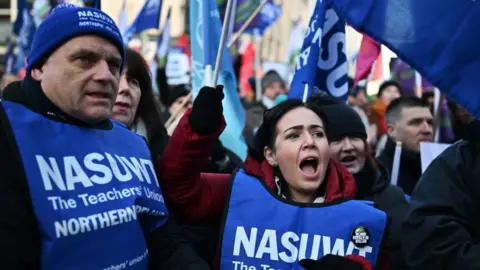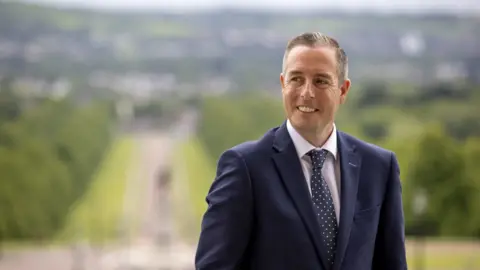School strikes: NI teaching unions postpone industrial action
 Charles McQuillan
Charles McQuillanNorthern Ireland's five teaching unions have agreed to postpone any further strike action after meeting the education minister.
They said talks about wage increases will begin in the next few days, but they would not be postponing any action short of a strike.
In November, teaching unions announced five days of strike action as part of a long-running dispute over pay.
Two of these went ahead, taking place on 29 November and 18 January.
After meeting the unions, Education Minister Paul Givan said negotiations over pay will hopefully begin next Tuesday.
The UK government is due to release a £3.3bn package now that power sharing has been restored at Stormont, about £580m of which is to settle public-sector pay claims.
'Different circumstance'
Justin McCamphill, National Official at the NASUWT, told t BBC NI's Evening Extra programme that the unions had been developing plans for three days of strike action before Easter.
"We're in a different circumstance now," he said.
"Devolution has been restored, we have an education minister, and we have pay negations which will be commencing soon."
However, he warned the education minister that without a "significant pay increase" teachers "will be back on strike action".
"Teachers haven't had a pay increase in three years," Mr McCamphill added.
 PA Media
PA MediaMr Givan welcomed the news following what he described as a "very constructive meeting" with the unions.
"Three hundred and fifty thousand children no longer able to go to school has a huge impact on those parents that then need to take time off work, provide alternative care arrangements, and that now won't be happening," he said
He added that formal negations would begin with the unions next Tuesday and called on the finance minister to "outline to executive colleagues what is the envelope of funding that is available".
"So that we can get on with a normal teaching environment, providing that education to the next generation, but also making sure that our teaching profession are given the proper recognition that they deserve in terms of the pay that they receive," he added.
Teachers were among thousands of public sector workers who took part in what was billed as Northern Ireland's largest strike in 50 years on 18 January.
